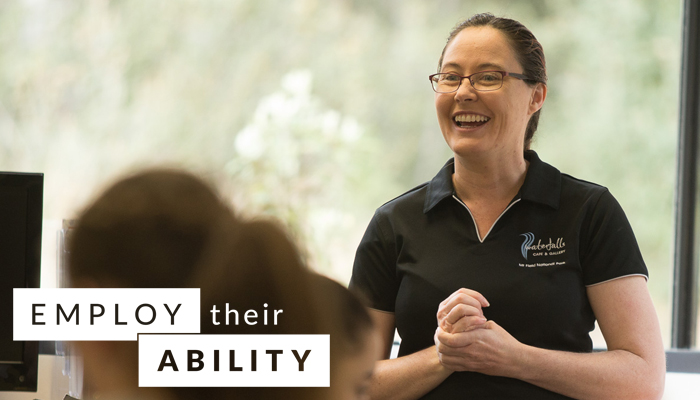The transformative power of work

For Waterfalls Café owner Rachel Power, watching the transformation of her staff from when she first hires them to the people they become is the most rewarding part of her job.
“One of the girls wouldn’t talk to customers at all when she started. Now she’s chatting to everyone! She even trains new members of the team,” Rachel says.
The Café’s manager, second in command and cook, Andrea Marriott, echoes that sentiment.
“There are a couple of girls in particular that have just blown me away,” says Andrea.
“It’s incredible to see just how much their confidence has grown since they started working at Waterfalls,” she says.
Andrea herself has anxiety, but sees her job as an escape.
“Basically – work is my safe place,” she says.
“It’s somewhere that I’m busy all the time, and I have something I can focus on other than my anxiety.”
In an industry known for its high turnover and rate of burnout amongst staff, Rachel and the Waterfalls team have created a welcoming environment for employees from all walks of life.
“Most people in hospitality last around five years or so before they start to burn out. A lot of my staff here have already passed that milestone and don’t look like they’re going anywhere any time soon!” says Rachel.
And she isn’t alone. According to the Suncorp Incusion@Work Index 2017-18, employees in inclusive workplaces – including those hiring people with disability – are four times more likely to stay with their employer (compared to those in non-inclusive workplaces).
Many employees with disability don’t need any changes to the workplace. For some members of the team, their disability means that they may need minor changes in the workplace or to their role. For Rachel, this has meant offering things like shorter shift times and setting some guidelines around the kinds of tasks allocated.
When employers are looking at hiring people with disability and making adjustments, they aren’t in it alone. JobAccess has a range of resources available for employers, and the Employment Assistance Fund (EAF) offers free workplace assessments and funding to help make adjustments.
“It’s something that I think every business should consider doing. At the end of the day the rewards for the people I hire and my business outweigh any extra effort,” says Rachel.
Employers can get started hiring people with disability and reap the benefits today. The National Disability Recruitment Coordinator (NDRC) is available to help you to develop clear job descriptions and promote roles to people with disability – who may just be the best person for the job.
Last updated:
